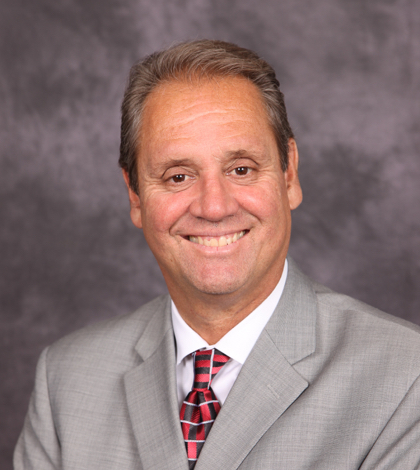Gene Valdez left Citizens Business Bank so he could start a consulting business for business executives. So far, the move is paying off.
In May, Gene Valdez left Citizens Business Bank to start a new career: running a consulting business aimed at high-level business executives.
It was a risky move.
Not only was Valdez applying the brakes to a successful 30-year banking career – he was senior vice president and business center manager when he stepped down – he had no clients when he started The CEO Teachers out of his home in Upland.
But Valdez was so used to dealing with executives who struggle to grow their business that he knew his business model could work, if he could get the word out.
Five months later, with 2016 winding down, Valdez says his career gamble is paying off. He has signed 10 clients, has several more in the pipeline, and he’s considering making some hires and finding some office space near his home.
Valdez, a Lynwood native who did his undergraduate work at UCLA and got his MBA at USC, has also branched out: he’s a part-time business faculty member at Chaffey College, and he’s developed an introductory course in entrepreneurship that is being taught at Arrowhead Christian Academy in Redlands.
“I loved my banking career, but this new business is more fulfilling,” Valdez said. “If you’re an entrepreneur and you come up with some ideas, in a business like The CEO Teachers you can implement them. That’s not as easy to do if you’re part of a big corporation.”
Valdez spoke recently with IE Business Daily about getting The CEO Teachers started, what kind of advice he’s been giving out and and why it’s so difficult for some businesses that want to expand to secure a loan.
Q: When you started The CEO Teachers back in May, you were confident about the business succeeding. How has it done so far?
A: Very well. I knew there was a need for this kind of business, and I’ve been proven right, at least to this point. I’m getting a new client every month, and I have about 10 total. That’s not bad for five months in business. All of the networking I’ve been doing is starting to pay off.
Q: Starting a new business is always difficult. What has been your biggest challenge getting this off the ground?
A: Getting the word out to potential clients, to people who might be interested in what I’m doing but don’t know about it. There’s a lot of competition out there. Like I said when we spoke last spring, get online and do a Google search. There are hundreds of business coaches out there, each with their own area of expertise. Based on that I decided to start a niche business, with the niche being finance.
Q: When you do sign a client, what kind of advice do give them?
A: Now that the economy is doing better, the big thing now is raising capital for expansion. They want to know how to arrange a business loan, which isn’t easy to do these days. Some of them want help them with their business plan, even a few that are already up and running.
Q: People start a business without putting together a business plan?
A: Some do, yes. Their business plan is in their head when they get started. I try to tell them that’s not a real business plan. A business plan is something you put on paper, in advance, and it probably should be updated every year, or every two years at the most. They can become obsolete very quickly.
Q: It seems like, with the economy doing better, the banks would be more generous in their lending practices, yet you say it’s not easy for a business to get a loan right now. Why is that?
A: Mostly it’s because of more regulation, on the state and on the federal level. It’s left over from the recession. In both instances, they’ve become a lot stricter about what they’re willing to let go through, and they’re a lot quicker to call something a bad loan that a few years ago might not have been considered bad.
Q: Aren’t tougher regulations needed so we don’t get a repeat of the housing crisis of 2007-08?
A: Yes, regulation can be good thing, and you do need it, but I think they’re getting too strict. It’s getting to the point where it’s going to keep a lot of businesses from expanding, and that’s not good. It’s also starting to impact the banks. They’re starting to get more reluctant to issue a loan because no bank wants to be told by a government regulator they’ve approved a bad loan.
Q: One of your clients, Greg Harsen, the president and chief executive officer of Paramount Machine Co. in Rancho Cucamonga, spoke highly of how you helped arrange a loan for his business.
A: Yes, they manufacture products for the aerospace industry, and they needed a loan for working capital. Greg was trying to get a loan from a local bank – I can’t say which one – and it became clear he wasn’t going to get the money he needed. Eventually, we were able to help them get the financing through another local bank.
Q: Are the banks that difficult do deal with?
A: A lot of them are. They’re like the woman who says she’ll marry you and then changes her mind at the last second, right when you get to the altar. It can get very frustrating. In the case of [Paramount Machine], the fact that they couldn’t get a loan almost kept them from expanding. If a business that’s doing well can’t get a loan to expand, that’s not good.
Q: You ran a business similar to The CEO Teachers 30 years ago. How has the consulting business changed since then?
A: The main difference is me. I have more experience, more knowledge. I’m a lot more confident about what I’m trying do now than I was then.
Q: Where do you expect to be next May, when The CEO Teachers turns one year old?
A: Working out of an office somewhere, maybe with two or three employees. Things are going well. There’s no question in my mind that I made the right move.
 IE Business Daily Business news for the Inland Empire.
IE Business Daily Business news for the Inland Empire.


